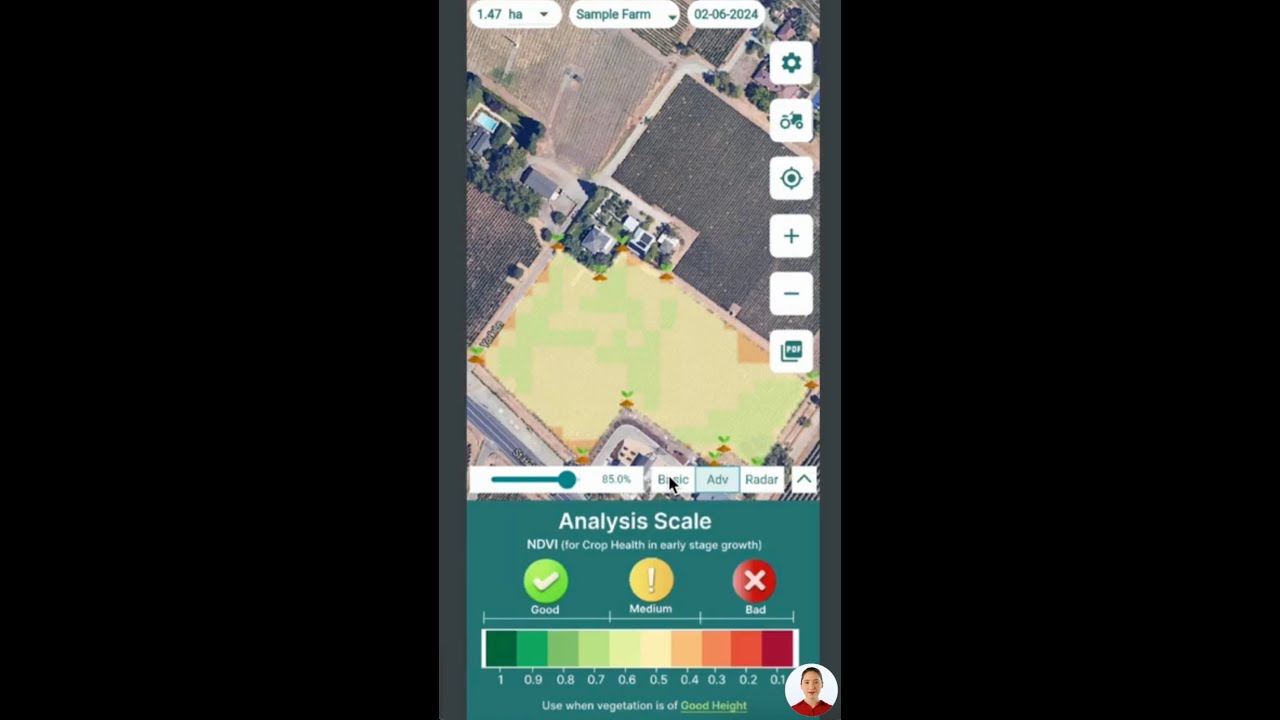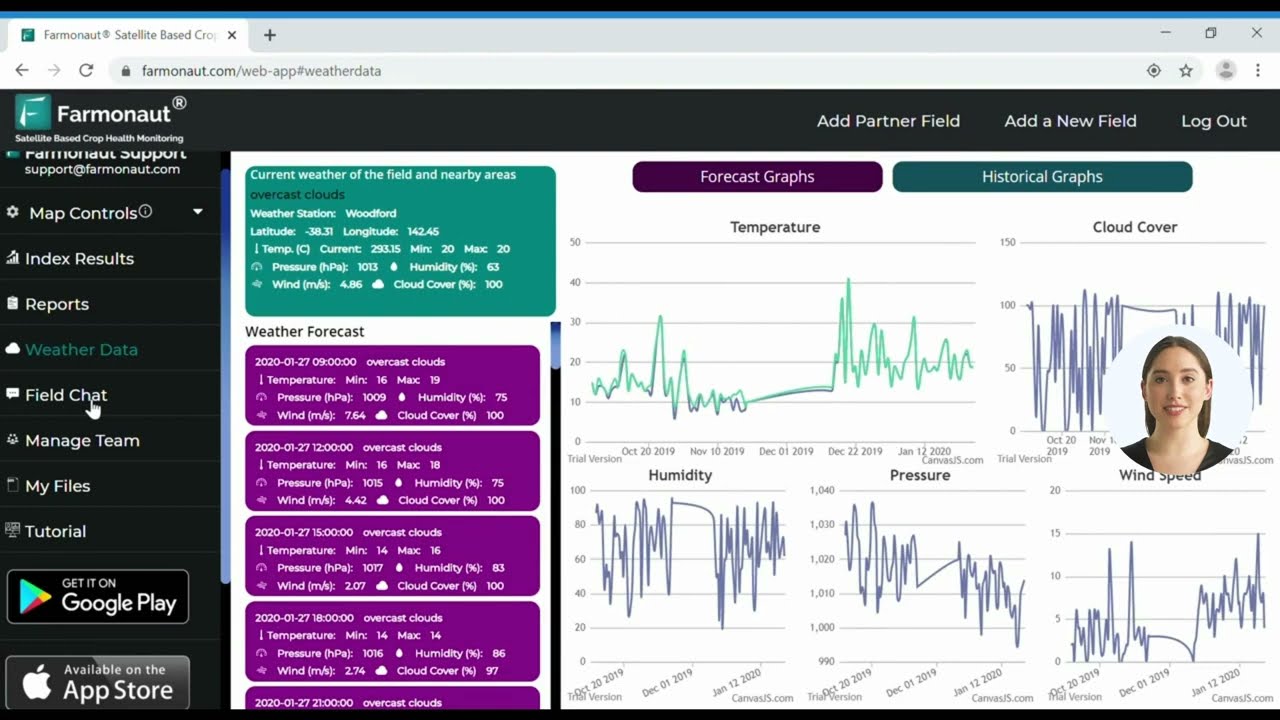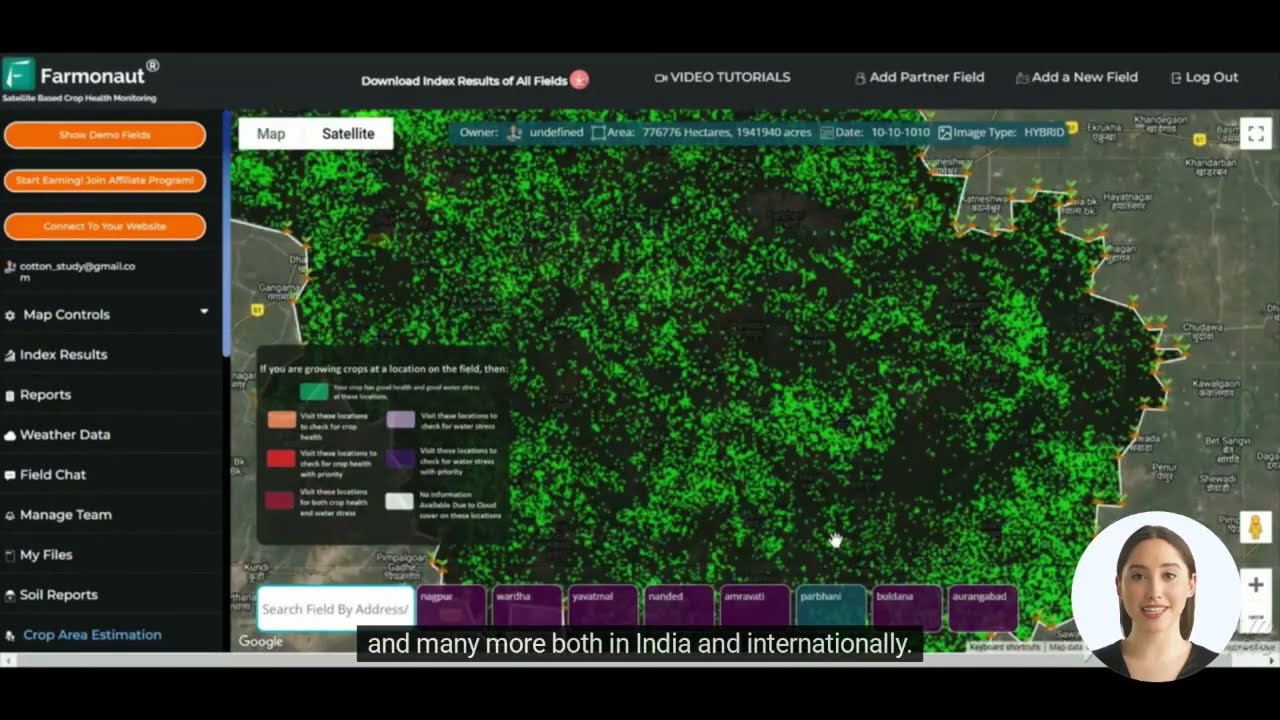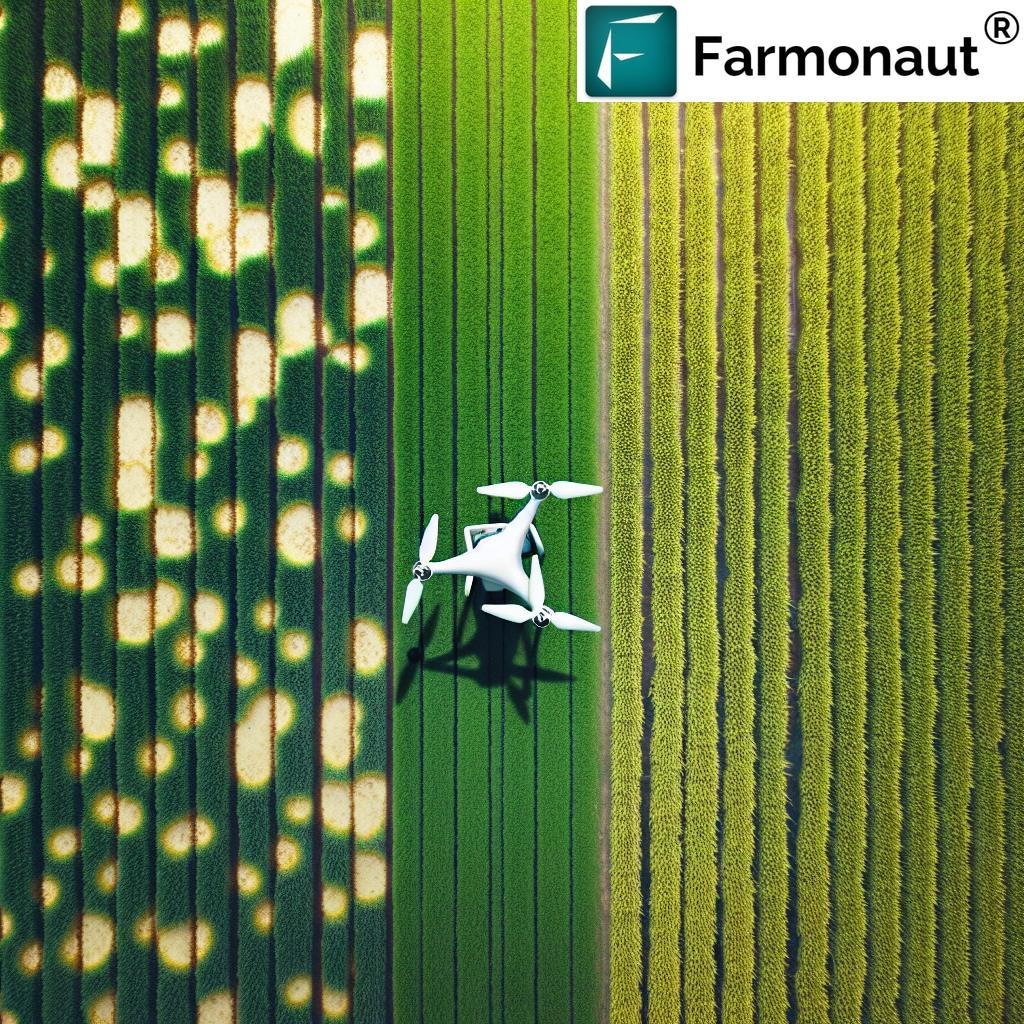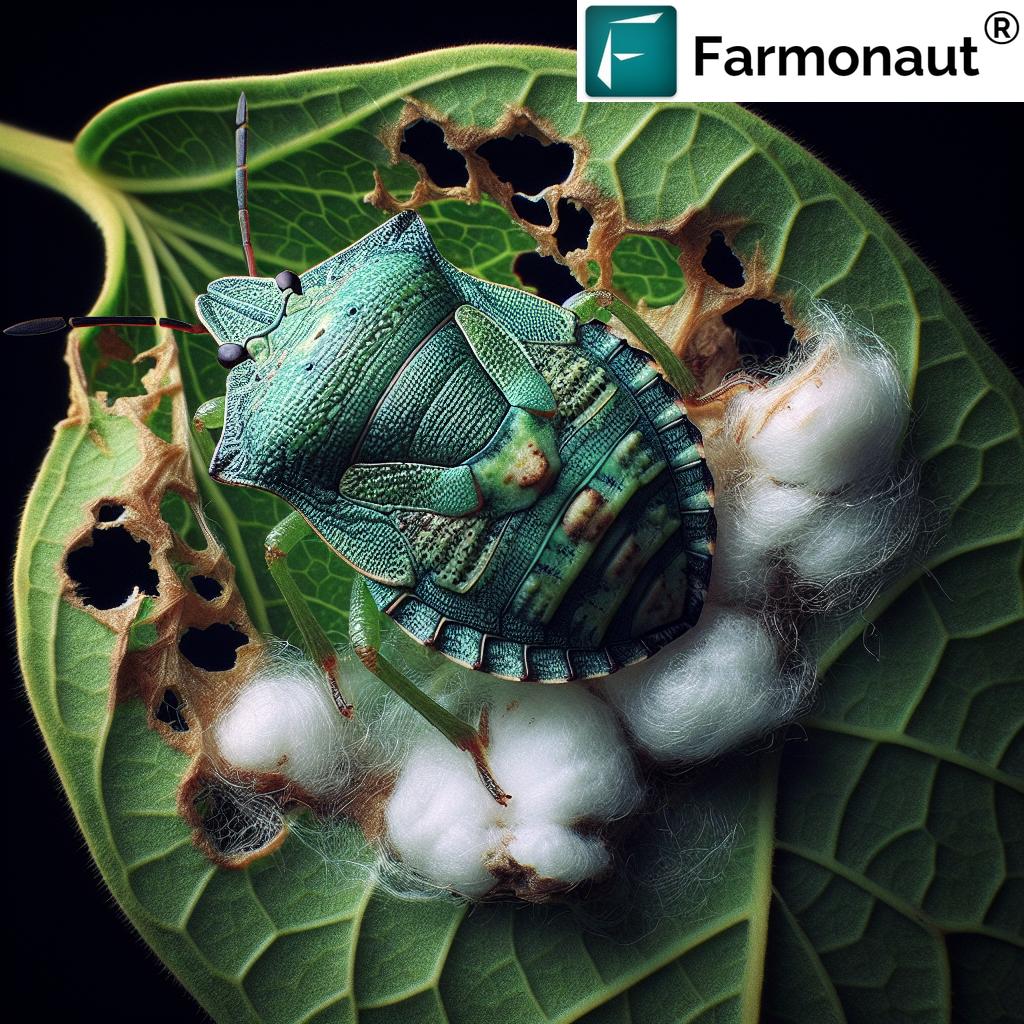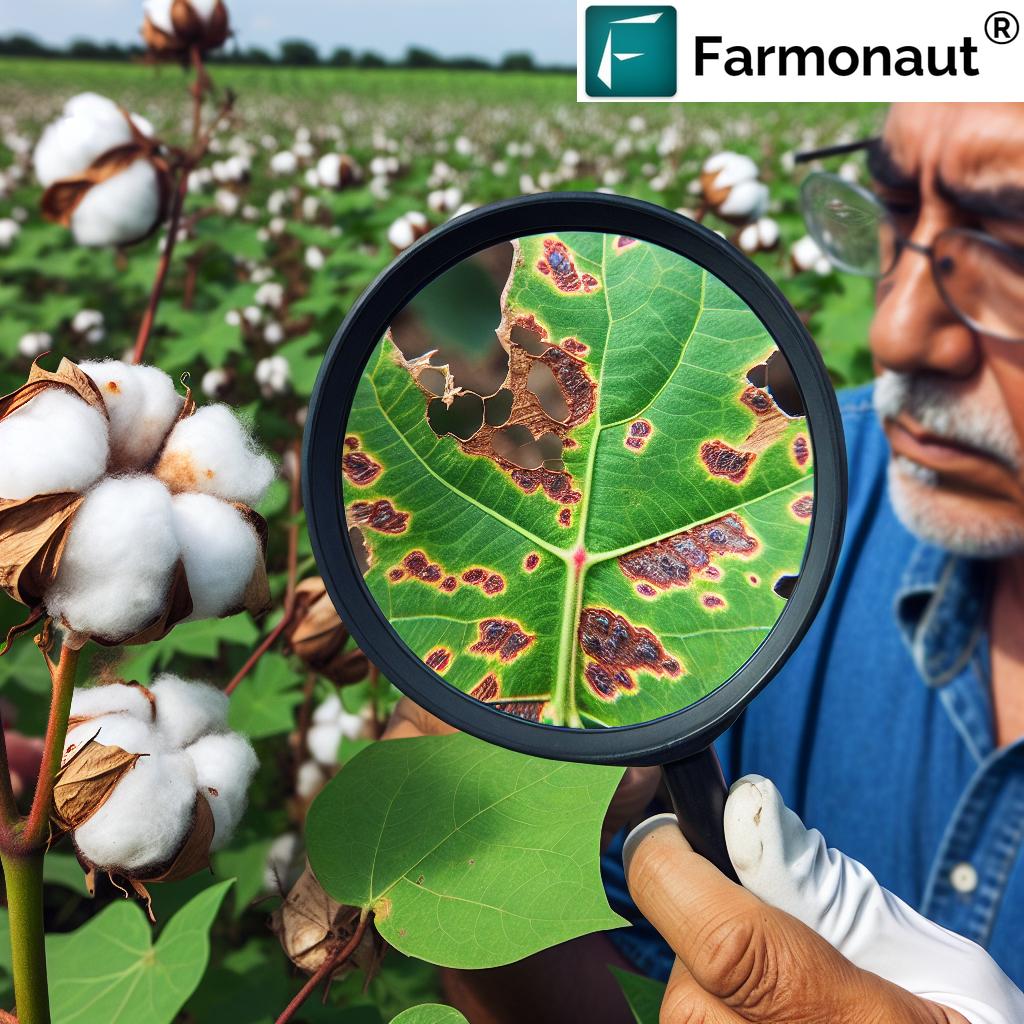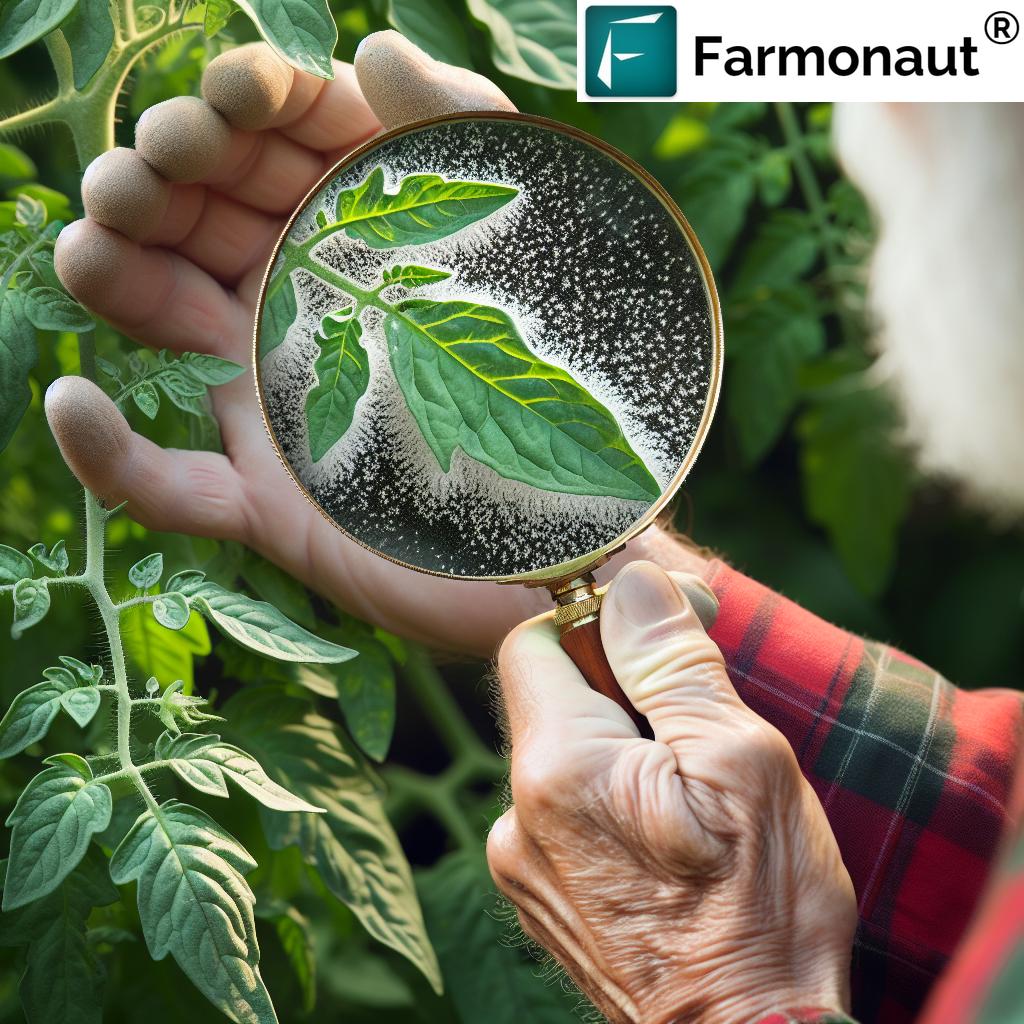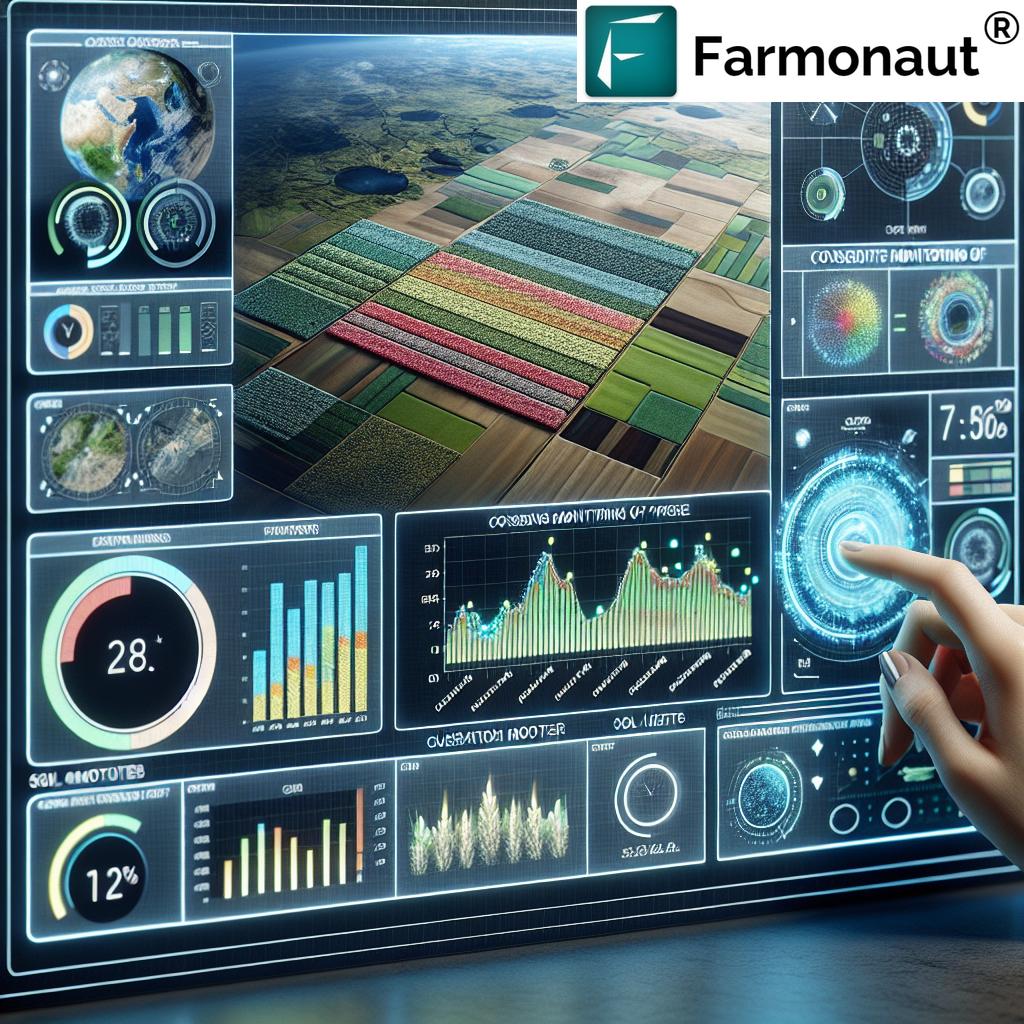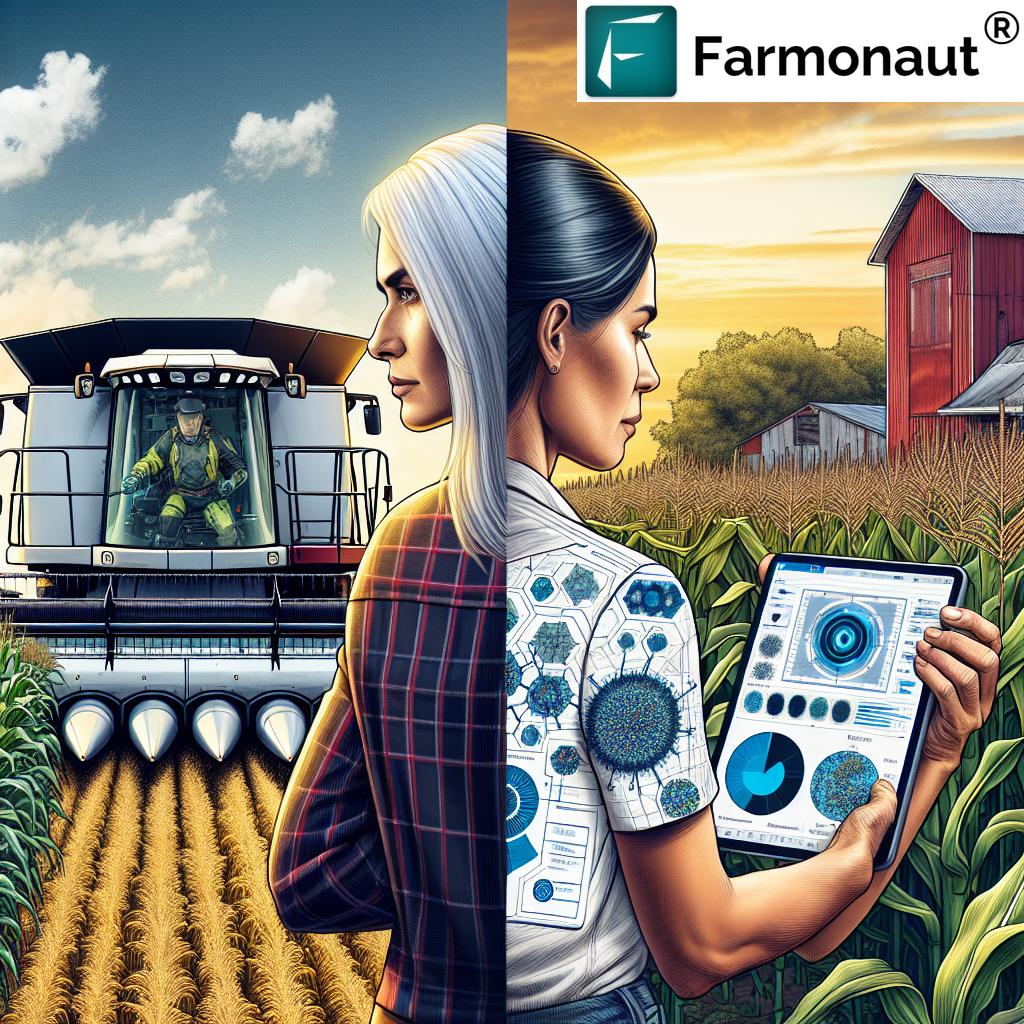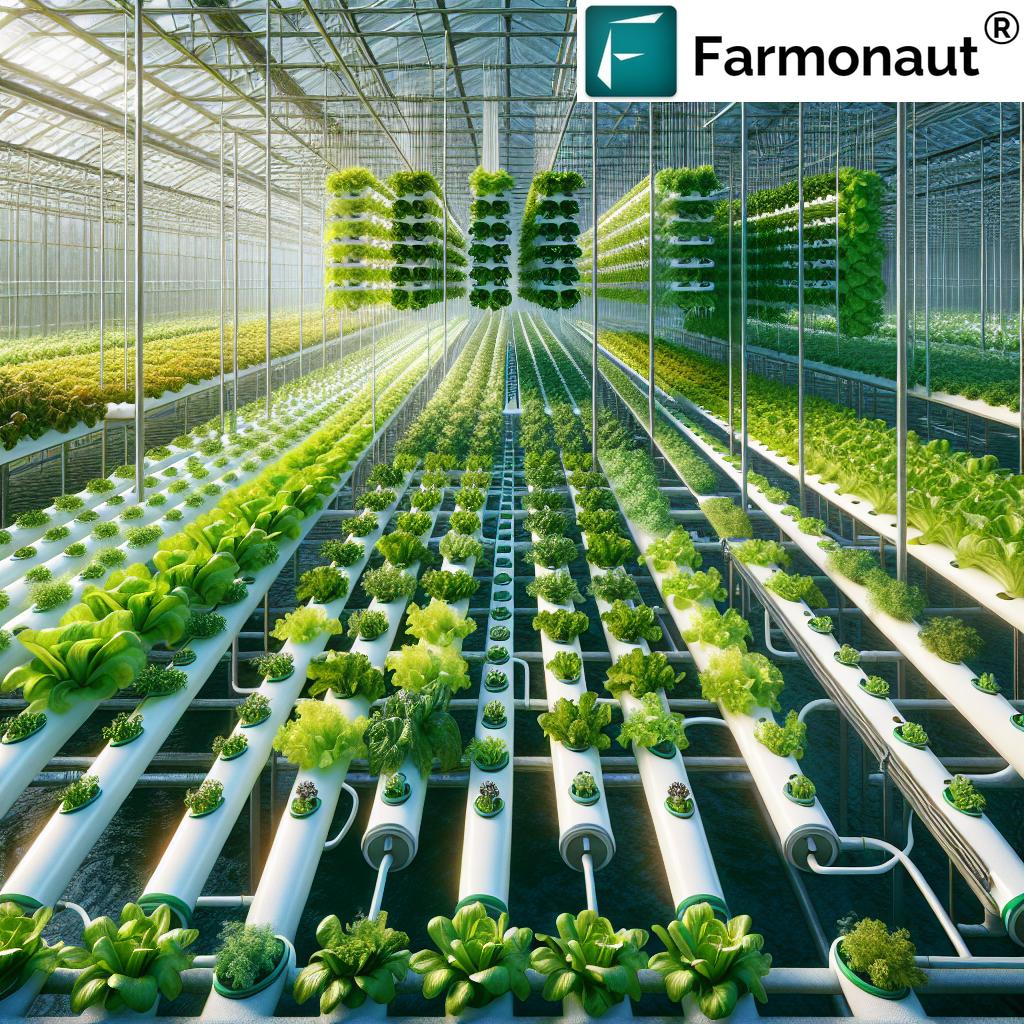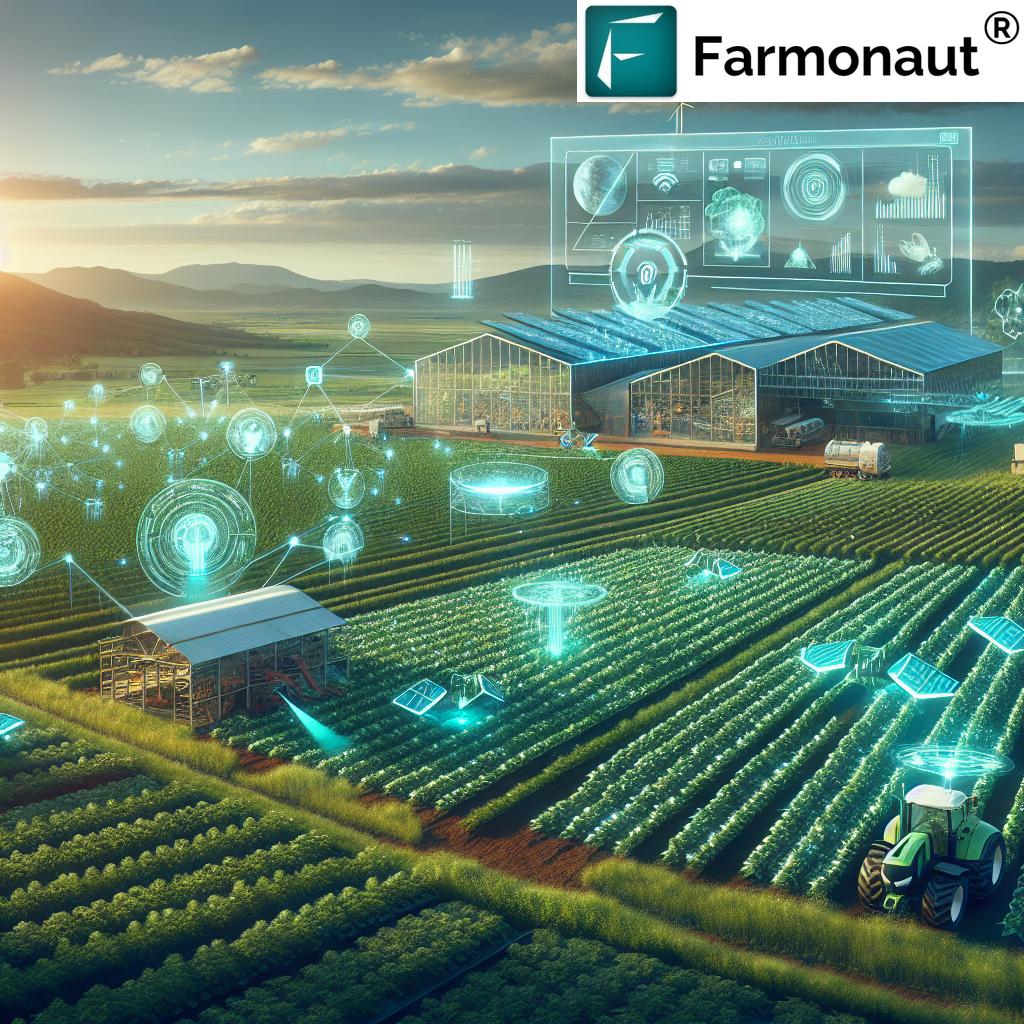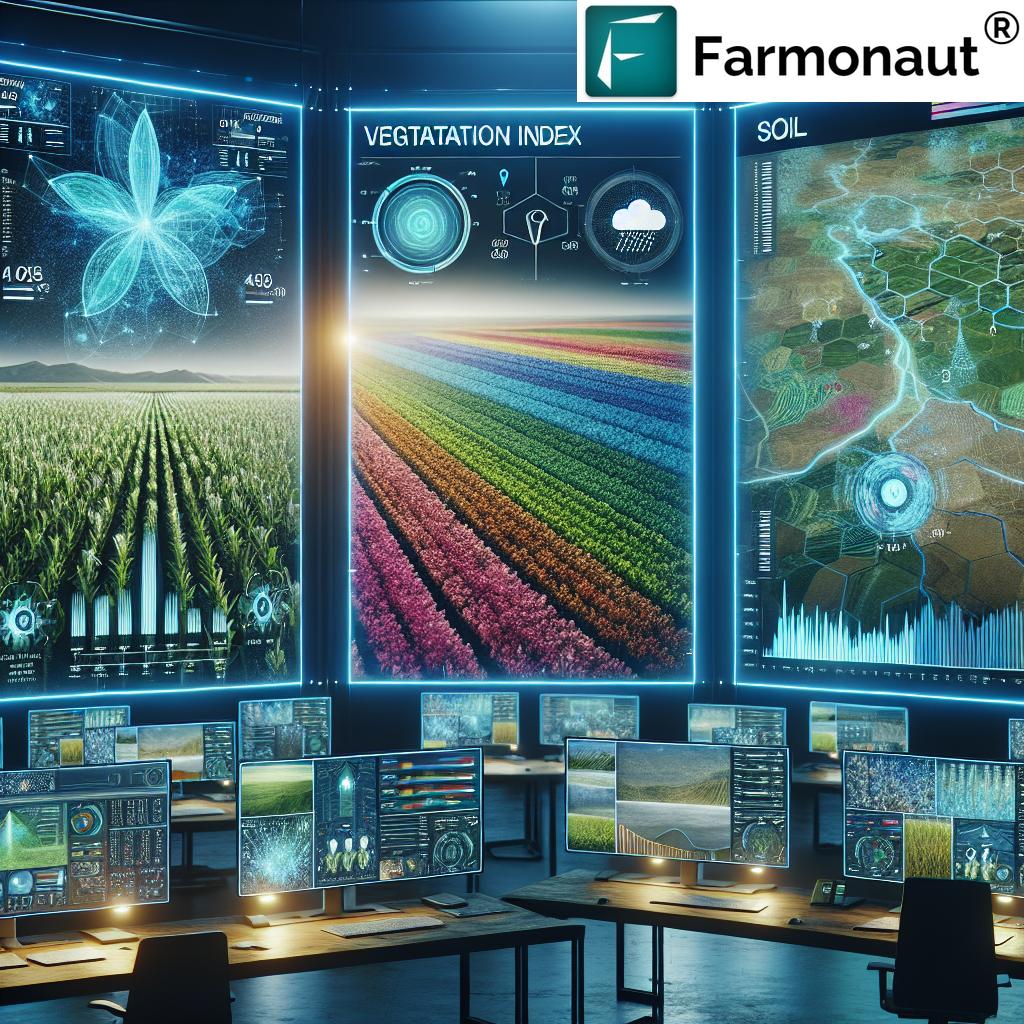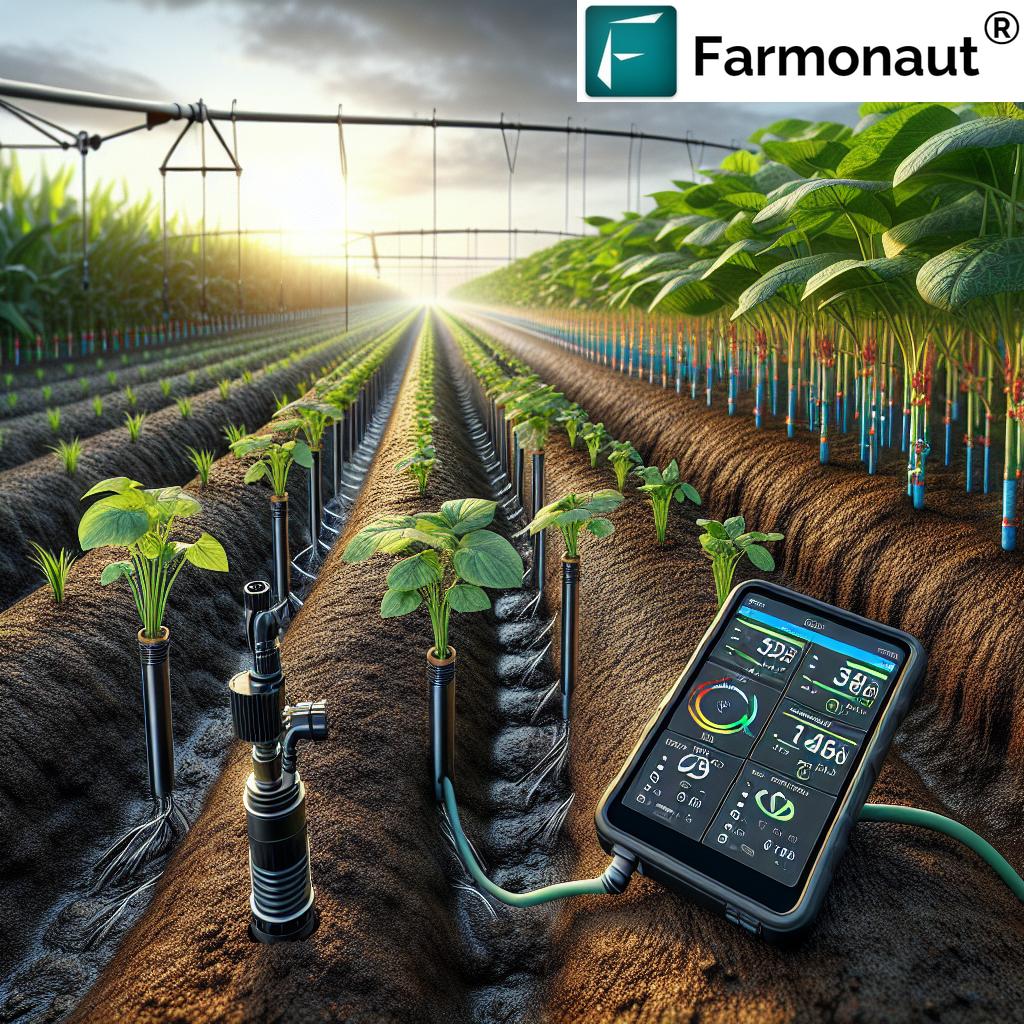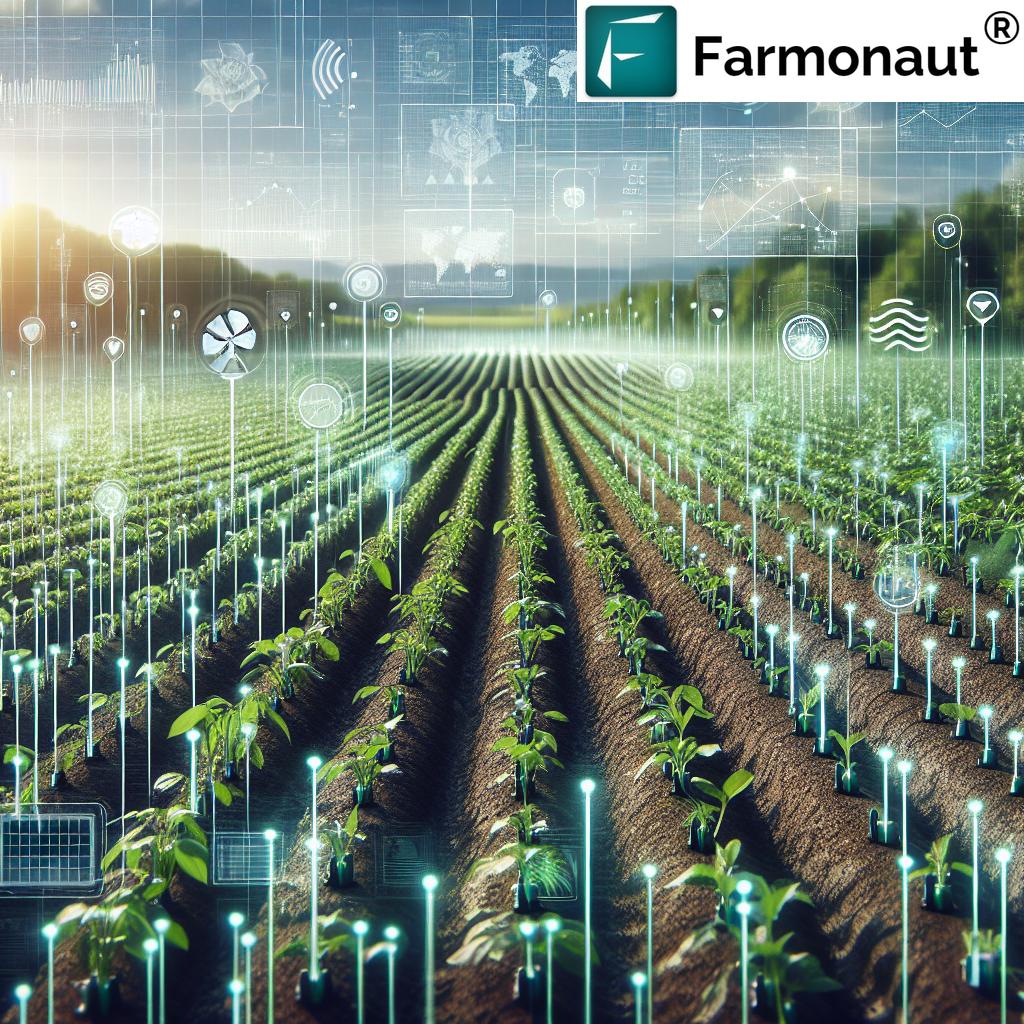Revolutionizing Agriculture: How Farmonaut’s Precision Farming Techniques Optimize Crop Yield and Soil Health
“Precision farming techniques can increase crop yields by up to 30% while reducing water usage by 20-50%, according to recent studies.”
In the ever-evolving landscape of agriculture, we find ourselves at the forefront of a technological revolution that promises to transform the way we cultivate our crops and manage our soil. As representatives of Farmonaut, we are excited to explore how precision agriculture techniques and crop monitoring technology are reshaping sustainable farming practices. This comprehensive blog post delves into the cutting-edge world of agricultural data analytics and smart irrigation systems, offering valuable insights for farmers, agribusiness professionals, and anyone interested in the future of farming.
At Farmonaut, we have developed innovative solutions that leverage remote sensing in agriculture and digital farming techniques to optimize crop yield and enhance soil health management. Our approach integrates advanced satellite imagery analysis and agricultural drone applications to provide farmers with unprecedented insights into their fields. Whether you’re a seasoned farmer or a student of agricultural sciences, this article will equip you with practical tips and thought-provoking ideas to stay ahead in the rapidly evolving field of precision agriculture.
Understanding Precision Agriculture Techniques
Precision agriculture is a farming management concept that utilizes information technology to ensure that crops and soil receive exactly what they need for optimum health and productivity. Let’s explore some key techniques that are revolutionizing the agricultural landscape:
- Remote Sensing: This technology allows us to gather information about crops and soil without physical contact. It includes satellite imagery, aerial photography, and ground-based sensors.
- Satellite Imagery Analysis: By analyzing multispectral satellite images, we can assess crop health, detect stress, and monitor growth patterns over large areas.
- Agricultural Drone Applications: Drones equipped with specialized cameras and sensors provide high-resolution imagery and data collection capabilities for precise field mapping and crop assessment.
- Smart Irrigation Systems: These systems use soil moisture sensors and weather data to optimize water usage, ensuring crops receive the right amount of water at the right time.
- Crop Monitoring Technology: Advanced sensors and IoT devices allow for real-time monitoring of crop conditions, enabling quick responses to potential issues.
At Farmonaut, we integrate these precision agriculture techniques into our platform, providing farmers with a comprehensive suite of tools to enhance their farming practices.
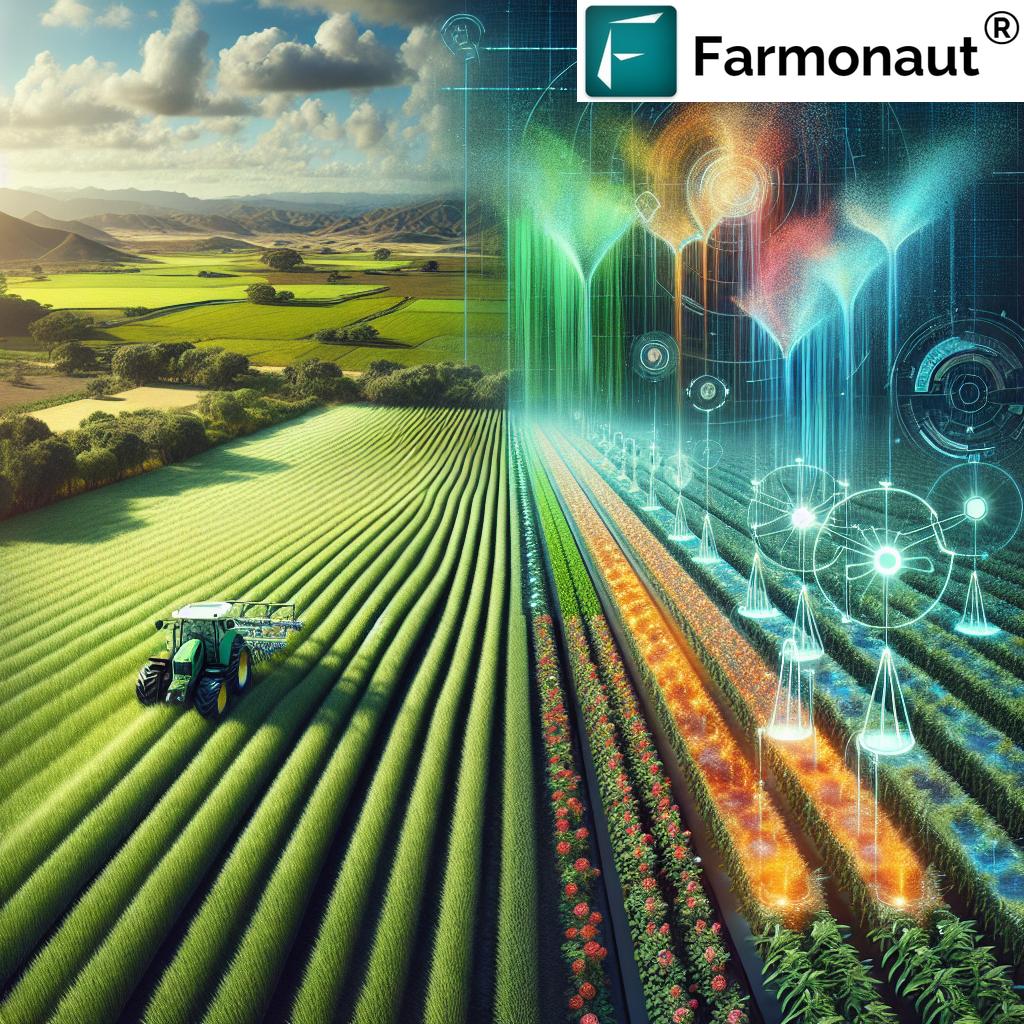
The Role of Agricultural Data Analytics in Modern Farming
Agricultural data analytics forms the backbone of precision farming. By collecting and analyzing vast amounts of data, we can make informed decisions that significantly impact crop yield and soil health. Here’s how data analytics is transforming agriculture:
- Predictive Analytics: By analyzing historical data and current conditions, we can predict potential crop issues before they become severe.
- Yield Forecasting: Data-driven models help estimate crop yields with greater accuracy, allowing for better resource allocation and market planning.
- Resource Optimization: Analytics help determine the optimal use of water, fertilizers, and pesticides, reducing waste and environmental impact.
- Soil Health Assessment: Advanced analytics provide insights into soil composition, nutrient levels, and microbial activity, guiding soil management strategies.
Farmonaut’s platform harnesses the power of agricultural data analytics to provide actionable insights to farmers, enabling them to make data-driven decisions that optimize their operations.
Enhancing Crop Yield Optimization with Digital Farming Solutions
Digital farming solutions are at the heart of modern agriculture, offering unprecedented opportunities for crop yield optimization. These solutions encompass a range of technologies and practices that work together to maximize productivity while minimizing resource use. Let’s explore how digital farming is revolutionizing crop yield optimization:
- Precision Planting: Digital tools help determine the optimal planting patterns, depths, and densities for different crop varieties and field conditions.
- Variable Rate Technology (VRT): This allows for the precise application of inputs like fertilizers and pesticides based on the specific needs of different areas within a field.
- Crop Health Monitoring: Regular satellite and drone imagery analysis enables early detection of crop stress, diseases, and pest infestations.
- Weather Integration: Advanced weather forecasting models are integrated into farming decisions, helping to optimize planting, irrigation, and harvesting schedules.
At Farmonaut, we’ve developed a comprehensive digital farming platform that incorporates these advanced techniques, providing farmers with the tools they need to maximize their crop yields sustainably.
Sustainable Farming Practices Through Advanced Technology
Sustainability is a critical concern in modern agriculture, and advanced technologies are playing a crucial role in promoting environmentally friendly farming practices. Here’s how technology is driving sustainability in agriculture:
- Reduced Chemical Usage: Precision application of fertilizers and pesticides minimizes environmental impact and reduces costs.
- Water Conservation: Smart irrigation systems and soil moisture sensors optimize water usage, crucial in water-scarce regions.
- Soil Health Management: Advanced soil analysis techniques help maintain soil fertility and reduce erosion.
- Carbon Footprint Reduction: Efficient resource use and reduced field operations lead to lower carbon emissions.
Farmonaut’s platform is designed with sustainability in mind, helping farmers adopt practices that are not only good for the environment but also economically beneficial in the long run.
The Impact of Remote Sensing in Agriculture
“Satellite imagery analysis in agriculture can detect crop stress up to 2 weeks earlier than traditional methods, improving response time.”
Remote sensing has revolutionized the way we monitor and manage agricultural lands. This technology allows us to gather crucial information about crop health, soil conditions, and environmental factors without the need for physical contact. Here’s how remote sensing is transforming agriculture:
- Crop Health Assessment: Multispectral and hyperspectral imaging can detect subtle changes in plant physiology, indicating stress or disease.
- Yield Prediction: By analyzing vegetation indices over time, we can make accurate predictions about crop yields.
- Soil Moisture Monitoring: Satellite-based sensors can measure soil moisture content over large areas, aiding in irrigation planning.
- Land Use Classification: Remote sensing helps in mapping and classifying different types of crops and land use patterns.
At Farmonaut, we leverage advanced remote sensing technologies to provide our users with timely and accurate information about their fields, enabling proactive management and informed decision-making.
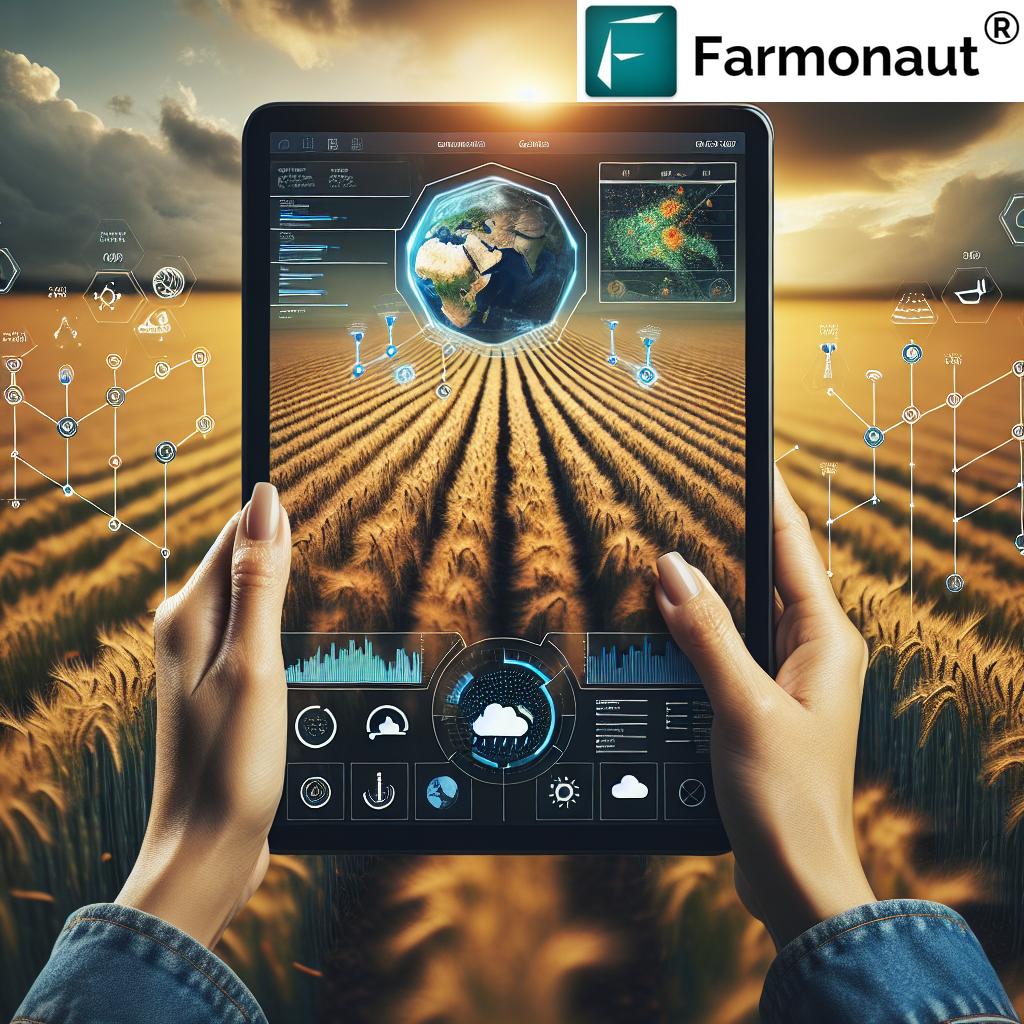
Smart Irrigation Systems: Optimizing Water Usage in Agriculture
Water is a precious resource in agriculture, and smart irrigation systems are at the forefront of water conservation efforts. These systems use a combination of sensors, weather data, and AI algorithms to optimize water usage. Here’s how smart irrigation is changing the game:
- Soil Moisture Sensing: Sensors placed in the soil provide real-time data on moisture levels, ensuring water is applied only when needed.
- Weather-Based Scheduling: Integration with local weather forecasts allows for adjustments in irrigation schedules based on expected rainfall.
- Precision Application: Variable rate irrigation systems can apply different amounts of water to different parts of a field based on specific needs.
- Remote Control and Monitoring: Farmers can monitor and control irrigation systems from their smartphones or computers, allowing for quick adjustments.
Farmonaut’s platform integrates with smart irrigation systems, providing farmers with data-driven recommendations for optimal water management.
Leveraging Agricultural Drone Applications for Precision Farming
Agricultural drones have emerged as powerful tools in precision farming, offering high-resolution imagery and data collection capabilities. Here’s how drones are being used in modern agriculture:
- Crop Mapping: Drones can create detailed 3D maps of fields, helping in planning and decision-making.
- Plant Health Monitoring: Equipped with multispectral cameras, drones can detect plant stress and disease early on.
- Precision Spraying: Some drones can carry and apply fertilizers or pesticides with high precision, reducing overall chemical usage.
- Yield Estimation: By analyzing drone imagery, farmers can estimate crop yields more accurately.
While Farmonaut primarily focuses on satellite-based solutions, our platform can integrate drone data to provide even more comprehensive insights to our users.
Soil Health Management: The Foundation of Sustainable Agriculture
Soil health is fundamental to sustainable agriculture, and advanced technologies are providing new ways to monitor and manage soil conditions. Here’s how modern techniques are improving soil health management:
- Soil Composition Analysis: Advanced sensors and lab techniques provide detailed information about soil nutrient levels, pH, and organic matter content.
- Microbial Activity Monitoring: New technologies allow for the assessment of soil microbial health, a key indicator of overall soil quality.
- Erosion Control: Precision land leveling and targeted cover crop planting help prevent soil erosion.
- Carbon Sequestration: Monitoring soil carbon levels helps in implementing practices that increase carbon sequestration, benefiting both soil health and climate mitigation efforts.
Farmonaut’s platform incorporates soil health data to provide comprehensive recommendations for soil management, ensuring long-term sustainability and productivity.
The Future of Farming: Integrating AI and Machine Learning
Artificial Intelligence (AI) and Machine Learning (ML) are set to play an increasingly important role in the future of agriculture. These technologies are enabling more sophisticated analysis and decision-making processes. Here’s how AI and ML are shaping the future of farming:
- Predictive Analytics: AI algorithms can predict crop yields, pest outbreaks, and market trends with increasing accuracy.
- Automated Decision Support: ML models can provide real-time recommendations for farm management decisions based on vast amounts of data.
- Robotic Systems: AI-powered robots are being developed for tasks like harvesting, weeding, and crop monitoring.
- Image Recognition: Advanced image recognition algorithms can quickly identify plant diseases, pests, and nutrient deficiencies from photos.
At Farmonaut, we are continuously exploring ways to integrate AI and ML into our platform, enhancing our ability to provide cutting-edge solutions to farmers.
Educational Resources for Aspiring Agronomists
For those looking to deepen their understanding of modern agriculture and precision farming techniques, there are numerous educational resources available. Here are some recommendations:
- Online Courses: Platforms like Coursera and edX offer courses in precision agriculture and agronomy from leading universities.
- Agricultural Extension Services: Many universities and government agencies provide free educational resources and workshops for farmers.
- Industry Conferences: Attending agricultural technology conferences can provide valuable insights and networking opportunities.
- Scientific Journals: Publications like “Precision Agriculture” and “Computers and Electronics in Agriculture” offer the latest research in the field.
Farmonaut is committed to promoting agricultural education and regularly publishes educational content on our blog and social media channels.
Precision Farming Techniques Comparison
| Technique | Key Benefits | Technology Used | Estimated Yield Increase | Soil Health Impact |
|---|---|---|---|---|
| Remote Sensing | Large-scale crop health monitoring | Satellites, Aerial imagery | 10-15% | Medium |
| Drone Applications | High-resolution field mapping | UAVs with specialized cameras | 5-10% | Low |
| Satellite Imagery Analysis | Wide-area crop stress detection | Multispectral satellite imagery | 8-12% | Medium |
| Smart Irrigation Systems | Water conservation, optimal crop hydration | IoT sensors, weather data integration | 15-20% | High |
| Crop Monitoring Technology | Real-time crop health insights | IoT devices, AI analytics | 12-18% | High |
Farmonaut’s Innovative Approach to Precision Agriculture
At Farmonaut, we’ve developed a comprehensive platform that integrates many of the precision farming techniques discussed above. Our approach focuses on making advanced agricultural technology accessible and affordable for farmers of all scales. Here’s an overview of our key offerings:
- Satellite-Based Crop Health Monitoring: We use multispectral satellite imagery to provide regular updates on crop health, soil moisture, and other critical metrics.
- AI-Driven Advisory System: Our Jeevn AI system analyzes data to provide personalized recommendations for crop management.
- Blockchain-Based Traceability: We offer solutions for tracking agricultural products from farm to consumer, enhancing transparency in the supply chain.
- Resource Management Tools: Our platform includes features for optimizing fleet management and monitoring carbon footprints in agricultural operations.
To explore how Farmonaut can revolutionize your farming practices, visit our web app or download our mobile apps:
For developers interested in integrating our satellite and weather data into their own systems, we offer a robust API. Detailed documentation is available in our API Developer Docs.
Frequently Asked Questions
Q: What is precision agriculture?
A: Precision agriculture is a farming management concept that uses information technology to ensure crops and soil receive exactly what they need for optimum health and productivity.
Q: How does satellite imagery help in agriculture?
A: Satellite imagery provides valuable data on crop health, soil moisture, and field conditions, allowing farmers to make informed decisions about irrigation, fertilization, and pest control.
Q: Can small-scale farmers benefit from precision agriculture techniques?
A: Yes, many precision agriculture tools, including Farmonaut’s platform, are designed to be accessible and beneficial for farmers of all scales.
Q: How does AI contribute to sustainable farming?
A: AI helps in optimizing resource use, predicting crop issues, and providing personalized recommendations, all of which contribute to more sustainable farming practices.
Q: What is the role of blockchain in agriculture?
A: Blockchain technology enhances transparency and traceability in the agricultural supply chain, helping to build trust between producers and consumers.
Conclusion: Embracing the Future of Agriculture
As we’ve explored throughout this blog post, precision agriculture techniques are revolutionizing the way we approach farming. From satellite imagery analysis to AI-driven decision support systems, these technologies are enabling farmers to optimize crop yields, improve soil health, and practice more sustainable agriculture.
At Farmonaut, we’re committed to making these advanced technologies accessible to farmers worldwide. Our platform integrates satellite-based crop monitoring, AI advisory systems, and blockchain traceability to provide a comprehensive solution for modern agriculture.
As we look to the future, it’s clear that the integration of technology in agriculture will only continue to grow. By embracing these innovations, we can work towards a more sustainable, productive, and resilient agricultural sector.
We invite you to explore how Farmonaut can help transform your farming practices. Visit our website or download our app to start your journey into the world of precision agriculture today.
Together, let’s cultivate a smarter, more sustainable future for agriculture.



